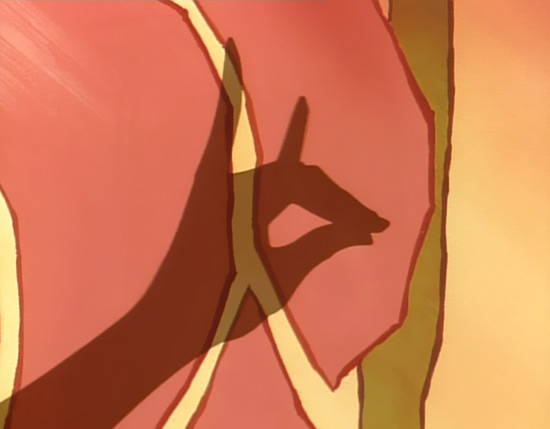09.02
Before I watched the show, I got a brief glimpse of which characters the fans loved the most, and I saw a lot of people choose Juri as their favorite of the cast. I had that in mind for the past few episodes, as her role in the student council seemed more brooding than any of Touga’s attempts at leading their plans. She resonated with a more mature feel than her cohorts, not partaking in Touga’s womanizing, Saionji’s abrasions, Nanami’s tricks, or Miki’s obsessions. Where the other members have recent love troubles in the midst, she’s still trying to learn to deal with a heart broken quite a while ago. She’s like the aloof big sister of the group, long since disenchanted from the promise of revolution that the others so desire.
Then of course, there’s the allusion in her being played by Kotono Mitsuishi, who played the main character of Ikuhara’s previous show. As such, this episode makes sure to juxtapose Juri with Utena in that regard, as who the protagonist of this show could be if given a different path. She’s gone through what Utena is experiencing, and serves as a sort of warning of the burdens that befall her kind of personality. That gets played with throughout this session, where she switches from being the more helpful of the council members to the most hostile in the same scene. One moment, she’ll be casual with Utena and talk to her as a fellow student. Soon after, she’ll try to kill her for representing her lost ideals way back when.
Juri’s rivalry with Utena offers quite a few questions as to one’s identity, like their talk about school uniforms. When Utena couldn’t tell who Juri was when in casual wear, it nods to how something like an outfit becomes who we are in the eyes of outsiders. Utena’s spent enough time dealing with the council members that she takes a moment to comprehend seeing one of them as a normal person and not as a rival at school. That goes in line with her own reason for wearing her uniform outside of school, seeing it as part of her inner self as much as her exterior self. It’s a bit like Kill la Kill in that regard, except much subtler and without the sentient clothes.
And along the lines of that show, there’s a bit of a destiny theme hinted at in this episode, as well as the denial of the idea that is destiny. Juri despises the belief in miracles and serendipity as ways of life, wanting possession of the Rose Bride simply to dispel that idea once and for all. While her desires are rooted in cynicism, they also finally shine light on what kind of revolution the council members are after. She wants to change a world woven by fair folk and make it something where one only has their own two hands to do craft their future instead of any divine plan. In short, a very stark contrast to what Princess Serenity believed in.
Speaking of Serenity, I like how her backstory initially leads you to believe that she was in love with the Mamoru stand-in, only for it to be her friend who left with him instead of Juri. It establishes the show’s message of how just because love can transcend social barriers; it doesn’t mean it will always connect on a one-to-one level. That’s an issue going on for people understanding their sexuality, with how their orientation won’t often be shared by those they’re in love with. You can see that as Juri’s jealousy for Utena, seeing her in a stable relationship with another woman while she can’t find something like that in her life.
